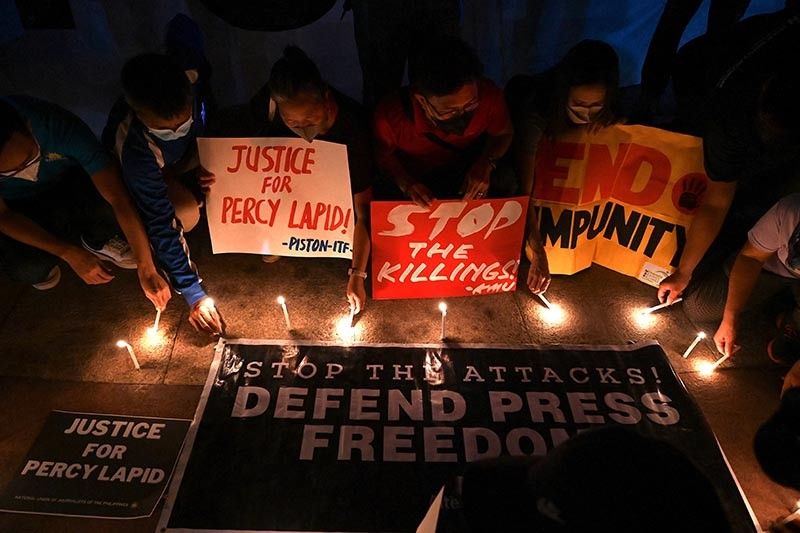Philippines slides down 2 places in 2024 World Press Freedom Index

MANILA, Philippines — The Philippines has sunk two spots to place 134th out of 180 countries in this year's World Press Freedom Index, with media conditions continuing to fall below the standards of a free press even without a government openly hostile to journalists.
The Philippines' slightly lower rating in Reporters Without Borders’ (RSF) annual index on press freedom comes a year after it soared 15 spots to its highest ranking in six years, with the media watchdog noting that President Ferdinand Marcos Jr.'s first six months in office had "loosened constraints on the media."
Based on the incidents monitored by the Center for Media Freedom and Responsibility (CMFR) and the National Union of Journalists of the Philippines (NUJP), more attacks and threats against journalists took place in the first 22 months of Marcos' presidency compared to the same period under Duterte's term.
At least 135 incidents of attacks and threats against media workers took place from July 2022 to April 30, 2024, according to the CMFR and NUJP, more than a third of which (50) were allegedly perpetrated by state agents.
This development reflects warnings by press freedom advocates that Marcos' milder approach to the media — a departure from Duterte's repeated verbal abuse to journalists — is only half the story.
"The adjustment may be a correction and reflects how bad the Duterte administration’s policies towards media were and the initial optimism with the improvements under the Marcos administration," said Jonathan de Santos, NUJP chairperson.
"While we can say that the current administration is not as openly hostile to the press, the policies and strategies used during the Duterte years are still there and journalists in the Philippines are still at risk," he added.
Red-tagging still worrisome
In its country report, the RSF described the Philippines as "one of the region’s most dangerous countries for media professionals."
While the watchdog noted that fewer "violent attacks" have taken place under Marcos, "harassment by means of threats and 'red-tagging' persists."
Red-tagging is the act of labeling people and organizations as rebels, terrorists and enemies of the state. While the practice exploded under Duterte, it has continued to be used against journalists, rights defenders and perceived critics under Marcos.
Most of the 75 cases of intimidation of the press recorded by CMFR and NUJP since 2022 involve the practice of red-tagging (45).
De Santos also noted in January that compared to the previous presidency, “where there was just one center of power, there are now several powerful figures that journalists might be wary to ‘offend."
In November 2023, radio anchor Juan Jumalon was gunned down while broadcasting on Facebook for 94.7 Gold FM. The gunman suspected to be behind his killing was arrested this week.
RSF also noted that the government has yet to decriminalize libel and cyberlibel, which human rights experts have criticized for being outdated laws that have a chilling effect on journalists and freedom of expression.
CMFR and NUJP said that eight journalists have been charged with libel since July 2022, while four of the five arrests recorded were related to cyber libel complaints.
De Santos said that the Philippines' poorer performance in RSF's 2024 press freedom index should prompt the government to take action on the more worrying aspects of the media environment in the country.
"The government could see this as a prompt to institute reforms like the decriminalization of libel and an official acknowledgment of the practice of red-tagging and an official end to that unwritten policy," he added.
Irene Khan, United Nations special rapporteur for freedom of expression, said during her visit to the Philippines that there is no "proper system" for the protection or prevention of attacks against journalists, with initiatives by the Presidential Task Force on Media Security to provide security escorts during elections "not enough."
Khan said journalists in the Philippines have become wary of approaching police, noting that this may be the "same police that may have tagged you or brought false charges against you."
Journalists face economic threats
The Philippines, once widely regarded as the freest press in Asia, is also dealing with a growing concentration of media ownership, while the sustainability of online independent press remains uncertain, RSF noted.
This is "a development accompanied by closer ties between media-owning families and political barons at regional and national levels," the watchdog said.
The media watchdog noted two worrying developments: the emergence of a third media giant owned by the Villar family's Villar Group, which has ties to former president Duterte's family, and the increasing media influence of House Speaker Martin Romualdez, the president's cousin.
Romualdez' family owns the national broadsheet Manila Standard, which last year established a joint venture with ABS-CBN's radio business.
- Latest
- Trending






























